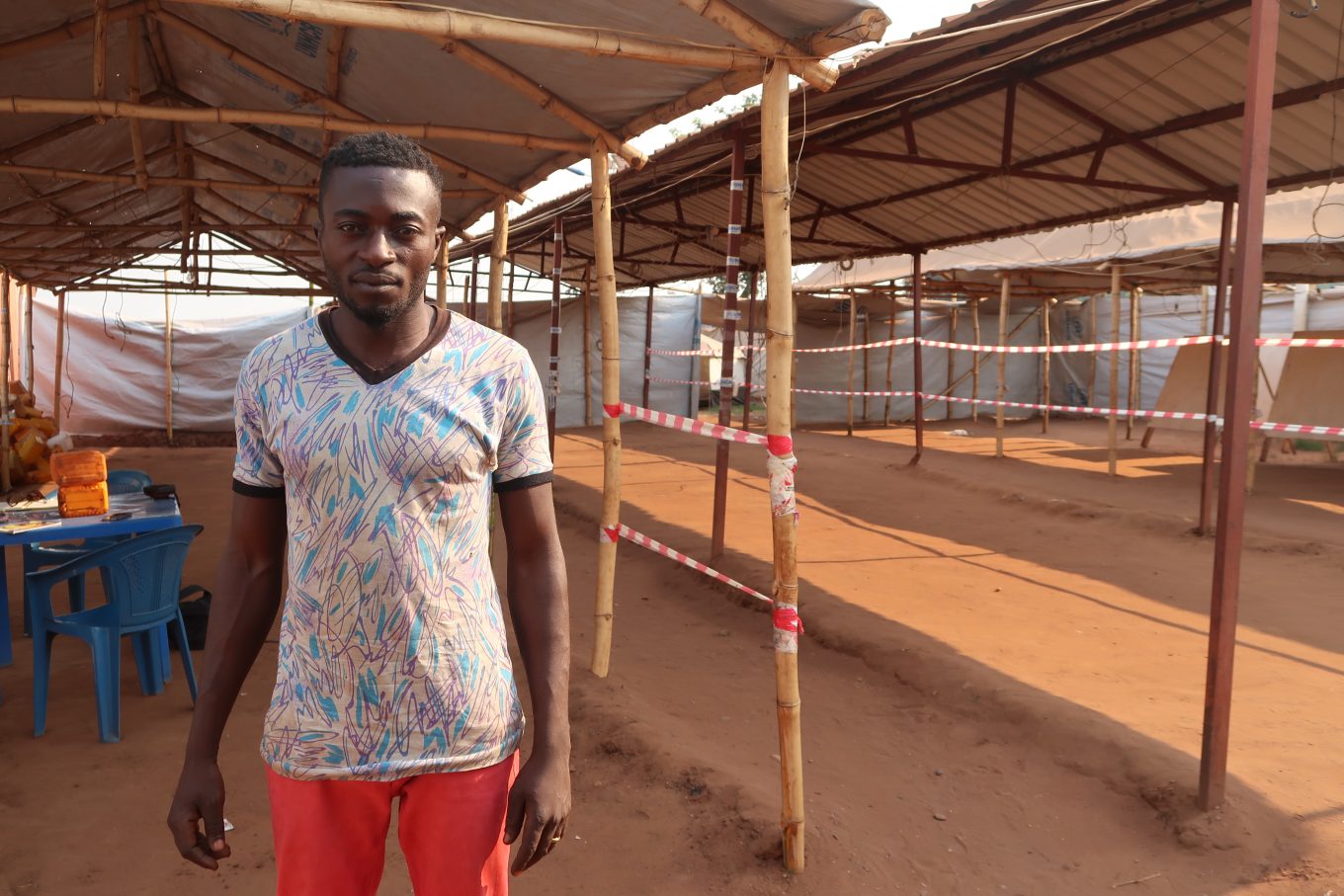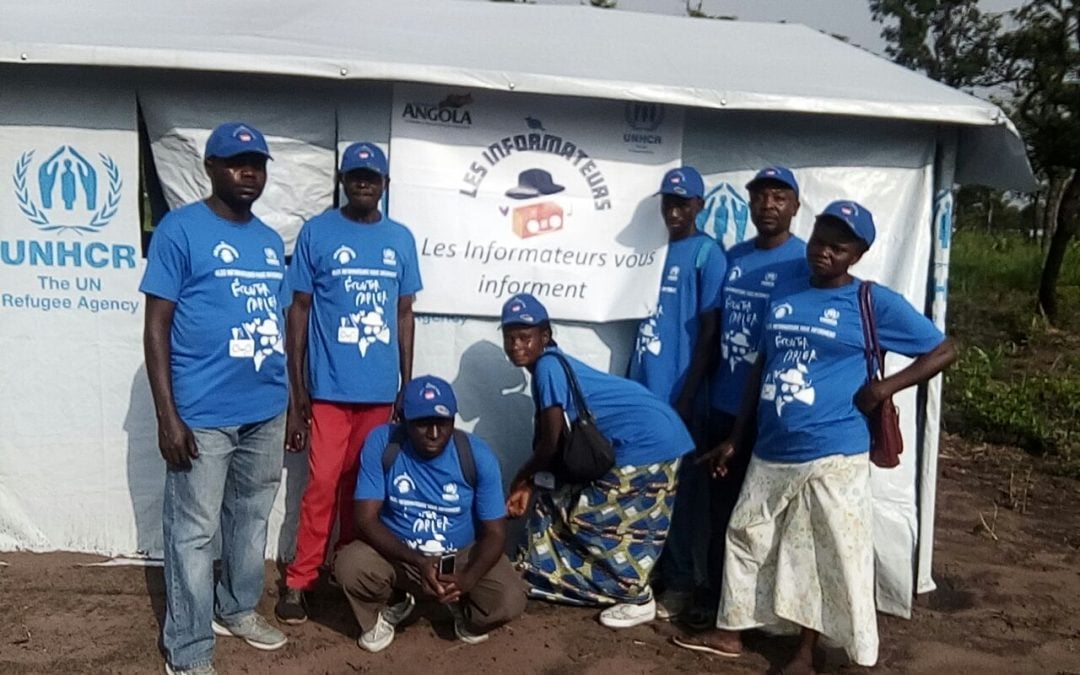I’ve always wanted to visit Angola and remember reading about the end of years of bloody civil war when I was at school. This year, I had the opportunity to travel to Angola for the first time, recently joining the UNHCR operation there for a few weeks. Since early May in 2017, the team have scaled-up operations to support over 30,000 newly arrived Congolese refugees. People have arrived into Luanda Norte region – to Dundo, close to the border – fleeing an outbreak of violence in the Kasaï provinces of the Democratic Republic of Congo (DRC). The operation had grown from a small team, based in Luanda, to a much larger team leading the emergency response in Dundo. In August, UNHCR opened a new settlement called Lovua to accommodate and protect the people who had newly arrived. The new site is over an hour’s drive from Dundo, and was being established from scratch. UNHCR Innovation Service was asked to support communication with communities – with a focus on the relocation to Lovua.
Who needs assessments?
When people are forcibly displaced, they clearly experience physical loss and extreme emotional stress – but their skills are mobile and should be identified and leveraged. Unfortunately, these local capacities are too often ignored or deprioritized in an emergency – causing disenfranchisement, lack of community buy-in, and undermining the effectiveness of a response. I hate the phrase: Needs Assessments. The assumption being that a humanitarian walks into a community to assess service gaps – only identifying what is missing and what people are lacking. However, the reality is that every community has capacities and inherent strengths. In Angola, we wanted to seek-out these skills – to see if as well as finding communication gaps we could start to identify refugee-led opportunities.
Making a song and dance out of it:
From our registration data, we knew that many members of the community have existing communications skills – including actors, journalists, and musicians. As we talked to refugees in the two reception centres, prior to their departure to the new settlement, it wasn’t difficult to identify examples of how the Congolese community was already working to meet the communications challenges they were facing. This included people selling phone SIMs and credit, the establishment of mobile charging stations and self-organised community meetings. Music and dance are important in Congolese culture – with artists well known across the region. Walking through the reception centres, you could hear infectious music playing, at almost any time of day. One day, we found a group of children and teenagers listening to a track and making a procession around the reception centre – of course, we wanted to know more!
We spoke to Leon, who arrived in April from DRC, and was responsible for the growing group of children. In DRC, Leon had been a mechanic – despite not having a background in music, he clearly had a passion and a drive for what he was currently working on. He told us about his idea to work with his friend Abor Patience – a musician – and record a track about the positivity of moving to Lovua. The song is extremely catchy, drawing on popular Congolese style. It is recorded in all of the local languages to engage the community and promote a strong pro-Lovua message. The launch of the song was clearly a success – all the children already knew the majority of the lyrics and were loudly joining in. Leon encouraged me to learn them too, clearly overestimating my linguistic ability – I managed to join in the chorus at least! Bluetoothing the track to my phone, he excitedly told me to share with ‘everybody’ – at least that’s what I understood over the loud music, energetic dancing and singing kids…

Leon: It’s so important to be together. We must avoid tribal speeches, and we must mobilize the population to work with each other.
Combatting tribalism
Leon continued to explain how important this project was for him. He described how, in DRC, the population was becoming divided by the war – with increasing levels of tribalism. He sees the role of communication and entertainment as one of unification, as a way of repairing divisions in society. This project had been entirely resourced by Leon and his friends. Of course, this had been no easy task during displacement – challenges included losing phones, numbers, and contact with each other. Once they managed to regroup, Leon shared the key information with Abor Patience, who developed the messages into the song. A fully engaged group – led by Leon – were then able to record in a studio in Dundo and create a great track. He described how he planned to use the song and conduct house-to-house mobilisation, following up with the community on the benefits of moving to Lovua. He also detailed how there were many others in his community who had similar ambitions and skills, and was excited that more initiatives could be supported and scaled in Lovua.
Les Informateurs
Access to information in Lovua will be critical for raising awareness of services and enabling people to make informed decisions. It is also vital that this information sharing is two-way, providing a platform for the community to share their voices and feedback – improving the effectiveness of services. To build-on information sharing activities like Leon and Abor Patience’s, UNHCR Innovation supported the operation with additional equipment – including mobile ‘boom-boxes’. We also provided training to staff, so they can support refugees and our partners with new recordings. We’re excited that the operation in Angola are establishing a refugee-led team called Les Informateurs and we are in the process of co-designing suitably bright T-shirts and caps with this group. Les Informateurs will be supported to develop, record and play audio messages in multiple languages – using the boom-boxes to expand outreach. They will also be provided with frequently updated information from our team and partners. Coordinating closely with this group will help ensure the consistency and quality of information being shared. Additionally, Les Informateurs will help by being ‘eyes and ears’ for UNHCR – supporting the sharing of community feedback in Lovua. This will be a critical component of UNHCR’s accountability to the community there, being a key channel for ongoing dialogue.
This project is still in early stages – we’re of course excited to see how it shapes and grows over the coming months.
Leon: This is what I want to do, it’s important … we must be one.
We’re always looking for great stories, ideas, and opinions on innovations that are led by or create impact for refugees. If you have one to share with us send us an email at innovation@unhcr.org
If you’d like to repost this article on your website, please see our reposting policy.

